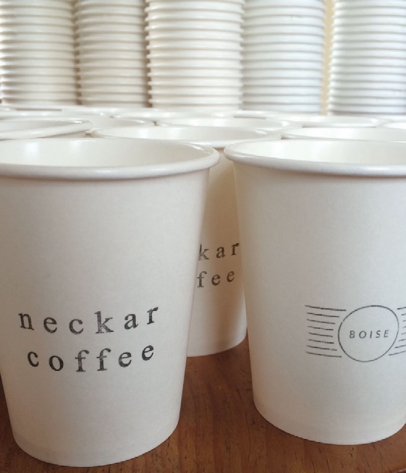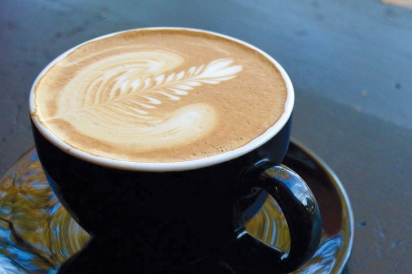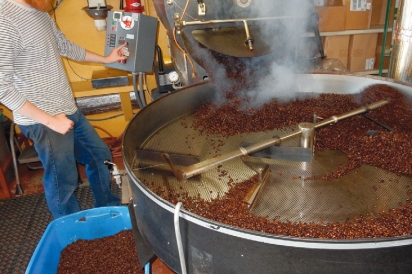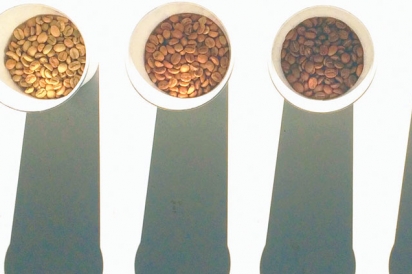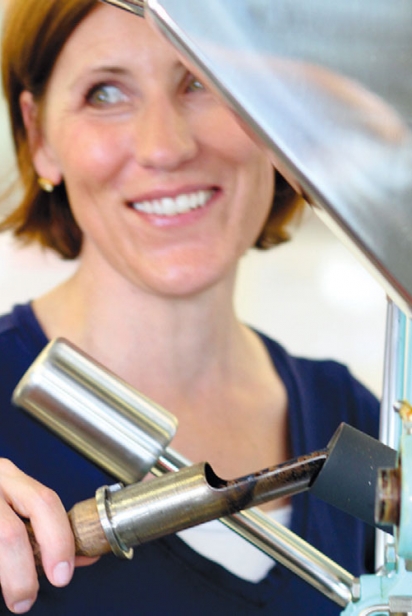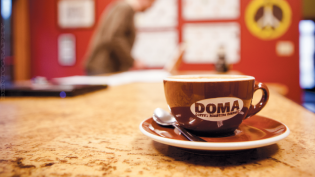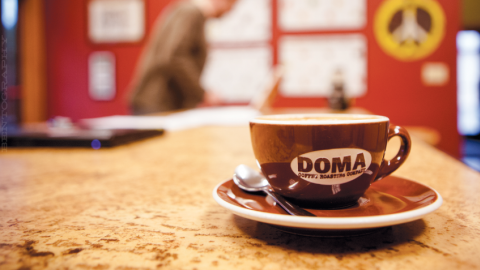Coffee with Connection: Idaho Roasters Ride the Third Wave
Light streams through the floor-to-ceiling windows at Twin Beans Coffee in Twin Falls as Paul Graff slowly pours hot water over a Chemex coffee vessel. The Chemex—a manual glass coffeemaker with a wood-wrapped neck—is one of the pillars of the Third Wave coffee movement, which focuses on elevating coffee from a mass-produced commodity to more of an artisanal product.
Third Wave coffee purveyors, like Graff, favor Fair Trade, single-origin beans, smallbatch roasting and exacting coffee preparation methods, like the Chemex.
A major root of the Third Wave coffee movement is the Bay Area’s Blue Bottle Coffee. Ten years ago, founder and CEO James Freeman started selling coffee roasted in his home kitchen, vended from a kiosk. In his book, The Blue Bottle Craft of Coffee, Freeman says it was his conscious decision to “construct” a beautiful cup of coffee rather than have customers be “confronted with a spigot.”
Freeman’s handcrafted vision has helped fuel a national movement now making exciting inroads across Idaho. And these regional roasters also have an additional element in common—a story that brought them to coffee that involves human connection and a desire to share something they love.
Graff opened Twin Beans in the former Crowley’s Soda Fountain space, just steps from where he played as a kid. After learning single-cup extraction, Graff bought a small roaster and started selling his beans and brews at the Twin Falls Farmers Market.
“It took three years, but eventually I gained regulars,” Graff said.
Most of Graff’s 18 coffee varieties are single source from Passionate Harvest, a Christian company committed to direct trade practices, meaning coffee beans are purchased directly from farmers.
In Post Falls, Rebecca Hurlen-Patano and her husband, Terry, are also focused on connection and sustainability. In 2000, the couple founded DOMA Coffee Roasting Company, which sells its beans across the state in recycled paper bags printed with vegetablebased inks. In addition to roasting its beans on a Loring Smart Roast, an eco-friendly coffee roaster that uses 80% less natural gas than a traditional roaster, DOMA is also committed to establishing direct, long-term relationships with coffee growers.
A couple of hours south in Troy, Hannah Binninger and her husband, Jon, operate Landgrove Coffee, a wholesale coffee-roasting company housed in a converted barn 20 miles outside of Moscow. The Binningers supply the One World Café and the Moscow Food Co-op with their freshly roasted beans and also have a steadily growing online business selling singleorigin coffees—everything from Fair Trade Organic Sumatra to Dry Process Ethiopian, where the coffee cherries are dried on raised beds in the sun instead of being soaked in tanks.
Hannah says her company is rooted in human connection.
“The beans are all touched by people all over the world—so many different people touched the coffee to get it here,” she said.
Because business has been booming, Landgrove recently hired Chris Malberg on as a full-time roaster. For Malberg, the roasting process itself is the reward.
“I like taking a raw product and turning it into a premium product that people can enjoy in the morning, making it an essential part of their day,” he said.
Neckar Coffee’s Grant Shealy agrees with that sentiment. For him, coffee is a “catalyst for conversation and connection.”
Shealy’s small Diedrich roaster churns out five-pound batches of beans in the back room at Woodland Empire Ale Craft in Boise, and he operates a coffee kiosk on Saturdays at the Boise Farmers Market. Shealy sources his beans from Coffee Shrub, a micro-seller out of Oakland, California, and typically roasts them to medium or “full city.”
“Good coffee will bring people,” he said, “But it’s the human element that makes it worthwhile. It’s really about sharing—that part is huge.”
The connection to others and the community is also the foundation of Lizzy’s Fresh Coffee in Ketchum. Owner Liz Roquet opened her doors in 2008 with a commitment to making great coffee and educating others about it, sans snobbery.
“Some coffee places have the attitude, ‘We’re awesome and you’re stupid,’” she said. “We want to communicate, ‘We’re awesome and we want you to be awesome, too.’”
Roquet acquires her single-origin, Fair Trade coffees from Central America, Indonesia and Africa. She roasts her beans in a Diedrich roaster, where she is careful to roast according to the flavor profile of each particular bean. In a typical month at Lizzy’s Fresh Coffee, Roquet roasts and sells around 2,000 to 3,000 pounds of coffee. Roquet, like her fellow roasters, sees her work as an essential part of the coffee continuum.
“My promise is to deliver on the promise made to the farmer of that green coffee,” said Roquet. “It’s not like a bottle of wine, where you uncork it and you’re good to go.”
Back at Twin Beans Coffee in Twin Falls, Graff is working to cultivate a taste in the community for artisan coffee, sans flavorings. Though he sells his fair share of mochas and vanilla lattes—an indication of what Graff calls the “diverse tastes” of his clientele—he says he’s also making some Third Wave coffee converts.
“The reward for me? The look on the customer’s face when they can sip a coffee with no added flavor and they light up because it’s awesome.”
Shelley McEuen teaches English at the College of Southern Idaho in Twin Falls, where she gardens, cooks and remains curious about the high desert landscape she has grown to love.


